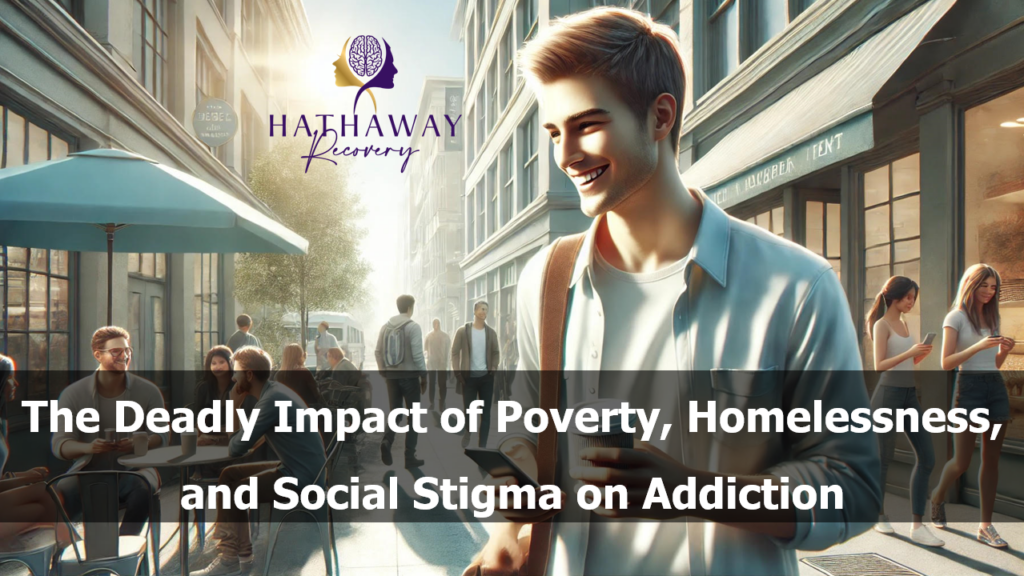Addiction remains a significant public health issue, affecting individuals from all walks of life. While addiction itself does not discriminate, the chances of surviving and overcoming it are not evenly distributed across society. Factors such as poverty, homelessness, and social stigma can exacerbate the dangers associated with addiction, creating formidable barriers that hinder recovery efforts and, in many cases, lead to tragic outcomes.

Poverty and Addiction: A Vicious Cycle
Poverty is a significant factor that intensifies the deadly consequences of addiction. Individuals living in poverty often encounter higher levels of stress and have limited access to essential resources, including healthcare, that are necessary for managing their overall well-being. This heightened stress, coupled with inadequate support systems, can increase vulnerability to substance use and addiction.
Once addiction takes hold, poverty becomes a relentless force that hinders recovery. Economically disadvantaged communities frequently experience higher rates of unemployment, lower educational attainment, and limited access to healthcare services—all of which contribute to the escalation of substance abuse. Research indicates that individuals residing in these communities are more likely to overdose on opioids and other substances. The financial strain associated with poverty makes it challenging to afford basic necessities such as food and shelter, let alone the costs of addiction treatment or healthcare services. This lack of support perpetuates a vicious cycle of addiction, making it increasingly difficult for individuals to break free.
The Role of Homelessness in Worsening Addiction
Homelessness is another critical factor that compounds the dangers of addiction. The absence of stable housing makes it exceedingly difficult for individuals to maintain their recovery. Homeless individuals often lack safe and secure places to store medications, attend regular medical appointments, or access the rest and care necessary for healing. The constant instability and stress associated with homelessness can push individuals back into substance use as a coping mechanism.
The loss of housing can undo years of progress for individuals in recovery, leading to a swift relapse. The connection between homelessness and addiction creates a perilous feedback loop, where the absence of stable housing exacerbates addiction, and addiction, in turn, perpetuates homelessness. Without a stable place to live, recovery becomes an elusive goal, and the risks associated with substance use—such as overdose—become ever more pronounced.
Social Stigma: A Hidden Killer
Social stigma represents one of the most insidious and dangerous aspects of addiction. Stigma manifests as societal judgment and discrimination against individuals struggling with addiction, often leading to their marginalization and exclusion from essential support networks. This societal judgment can prevent individuals from seeking the help they desperately need. Feelings of shame, guilt, and fear of being judged create a powerful deterrent to accessing treatment and support services.
Historically, addiction has been viewed as a moral failing rather than a health issue, leading to the criminalization of drug use and a punitive approach to addressing addiction. Although societal perceptions of addiction are evolving, stigma remains a formidable barrier to recovery. Healthcare providers may be reluctant to treat individuals with addiction, further exacerbating the challenges faced by those in need. The internalization of society’s negative views by individuals struggling with addiction leads to unnecessary suffering and an increased risk of overdose deaths.
Breaking Down the Barriers to Recovery
While poverty, homelessness, and social stigma undeniably heighten the dangers associated with addiction, these factors need not be insurmountable obstacles. To provide everyone with the best chance at recovery, it is imperative to address these underlying social determinants. This includes improving access to affordable housing, creating more job opportunities, and implementing comprehensive poverty reduction strategies. Equally important is the need to change societal perceptions of addiction, shifting away from a punitive mindset and embracing a more compassionate and supportive approach.
Addiction may not discriminate in its effects, but societal structures do. By addressing the social factors that make addiction more dangerous, it is possible to help more individuals find their way to recovery. Creating a healthier and more supportive community for everyone is not just a moral imperative; it is essential for breaking the cycle of addiction and preventing the unnecessary loss of life.
A New Beginning with Hathaway Recovery
Hathaway Recovery stands out in the field of addiction rehabilitation by emphasizing personalized care. Recognizing that each individual’s journey with addiction is unique, they create customized treatment plans that address the specific needs and circumstances of their clients. Their approach integrates evidence-based practices, including both behavioral and experiential therapies, aiming to tackle not just the addiction, but also the underlying personal issues that fuel addictive behaviors.
The environment at Hathaway Recovery is carefully crafted to foster healing and progress. Their facilities offer a serene and comfortable setting, which is vital for navigating the difficult path to overcoming addiction. This dedication to privacy and comfort reflects their understanding of the need for a secure and supportive atmosphere throughout the recovery process.
Hathaway Recovery offers a promise of a new beginning, extending its support to those seeking help. Their Admissions Department provides confidential assistance and can be reached at (909) 971-3333, guiding individuals on a transformative journey toward a healthier, more fulfilling life. Raising awareness about the dangers of substance use is a responsibility that extends beyond parents and educators; it is a shared obligation of the entire community.






